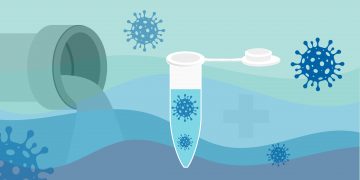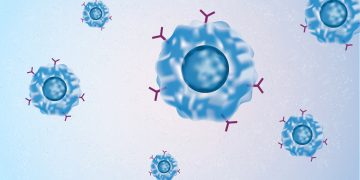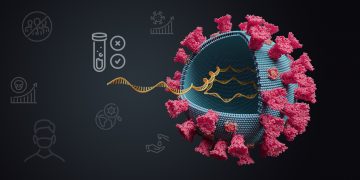
Wastewater SARS-CoV-2 Testing with Droplet Digital PCR (ddPCR) Technology
Wastewater-based epidemiology indirectly monitors infection rates in a community based on pathogen levels in local wastewater. Because symptomatic and asymptomatic SARS-CoV-2 infected individuals shed viral RNA in sewer systems, analysis of SARS-CoV-2 in sewage networks can provide information about SARS-CoV-2 infections within the community. However, the accuracy of these data depends on the quality of the wastewater testing method. During the COVID-19 pandemic, Droplet Digital PCR has proven that it has the sensitivity needed to detect outbreaks and monitor SARS-CoV-2 variants in communities via wastewater testing.

Bispecific Antibodies and Cancer Immunotherapy
Bispecific antibodies (bsAbs) are an important addition to the immuno-oncology toolbox. Designed to recognize two distinct epitopes, bsAbs have enhanced binding, specificity, and efficacy compared to current monovalent antibody therapeutics, making them exciting candidates for more targeted cancer treatments. Learn about bsAbs and how our tools can help scientists with their research on therapeutic candidates.

Monitoring CAR T-Cell Therapy Quality with Droplet Digital PCR
The CAR T-cell manufacturing process involves high potential for variability. Learn how sensitive ddPCR assays can be used to ensure safety and efficacy.

Viral RNA Preparation for Molecular Pathogen Detection: A New Application for Chelex 100 Resin and InstaGene Matrix
Although vaccines have helped alleviate the negative impact of COVID-19, its persistence across many areas of the globe reveals a continuous need for rapid, accurate, and economical COVID-19 testing. But is it even possible to isolate and detect viral RNA rapidly and economically? Here we highlight a repurposed tool for improved COVID-19 detection: Chelex 100 Resin and the related InstaGene Matrix for rapid, cost-effective viral RNA preservation and detection.

CDMOs Drive Cell and Gene Therapy from Behind the Scenes
As more of the cell and gene therapies revolutionizing healthcare are approved for use, innovator companies usually get the credit. But many therapies would never make it to market without the expertise and capabilities of contract development and manufacturing organizations (CDMOs) operating behind the scenes. Learn more about how CDMOs enable new cell and gene therapies to come to market, and how Droplet Digital PCR can help.

Top 5 Takeaways from ddPCR World 2021
Precision diagnostics for cancer. COVID-19 surveillance in wastewater. Quality control of cell and gene therapies. These were just a few of the cutting-edge applications on display at the Droplet Digital PCR (ddPCR) World 2021 symposium. Recapping the event in 5 takeaways, moderator Francisco Bizouarn shares how international experts are leveraging ddPCR technology to solve today’s scientific and public health problems.

Advancing Molecular Diagnostics for Myelodysplastic Syndrome
No patient who has survived cancer wants to hear that they’ve relapsed. But hearing it sooner rather than later can dramatically increase the chances of finding a successful, potentially life-saving treatment. Using next-generation sequencing and Droplet Digital PCR, researchers at the University of Uppsala aim to detect relapse by monitoring patient-specific biomarkers. Read about their ongoing clinical study.

Advanced Cancer Therapeutics: Increasing Efficacy and Specificity and Reducing Toxicity
Research into human diseases has led to the development of novel monoclonal antibody drugs. These monoclonal antibody therapies have been successful because of their specificity and selectivity. However, ongoing development and successfully launching a new mAb drug require robust and reliable methods to screen for drug targets, demonstrate drug safety and efficacy, and scale up manufacturing to meet the stringent regulatory guidelines required for approval.

With Cell and Gene Therapies, Success and Quality Control Go Hand-in-Hand
While the FDA has approved Abecma, the first CAR-T cell therapy in its class, regulatory approval is just the beginning for cell and gene therapies. Such therapies’ safety and financial viability rest on a robust manufacturing and quality control program with the flexibility to scale up and out. Droplet Digital PCR is a sensitive biopharmaceutical quality control tool, offering absolute quantification of nucleic acids and other molecules in a sample.

The Role of ddPCR in Developing Safe and Effective AAV-Based Gene Therapies
Developing adeno-associated virus (AAV)-mediated gene therapies requires accurate and precise quality control. Read how Droplet Digital PCR technology provides the sensitivity needed to assess the potential safety and effectiveness of these treatments.
